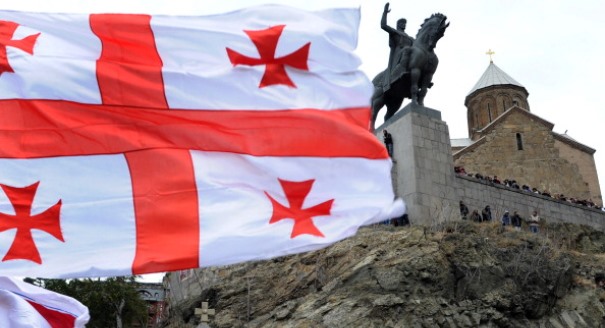A year is a very long time. It is not until the end of 2014 that Georgia and Moldova intend to sign the EU trade and association agreements that the two governments initialed last November in Vilnius, Lithuania. Both countries will need intensive EU help to stay the course over this long stretch.
In the run-up to November’s Eastern Partnership summit, Russia did everything possible to prevent Moldova from initialing the accord, which would create a framework for cooperation with the EU. Yet despite threats of trade embargoes and cuts to energy supplies, Moldova’s government held firm.
In the case of Georgia, there was far less Russian pressure. In fact, just before the Vilnius summit, Moscow finally lifted its embargo on Georgian wine, mineral water, and other products destined for the Russian market.
But don’t expect for one moment that Russia will give up its attempts to prevent both countries from cementing their ties with the EU. Once next month’s Sochi Winter Olympics are over, Russian President Vladimir Putin will turn his attention back to Moldova and Georgia in a bid to weaken public support there for the EU accords.
Moldova is already fragile and therefore susceptible to Russian pressure. Iurie Leancă’s pro-European government is far from united. In addition, the opposition Communists, who had previously supported EU integration, have turned their back on the project and are now increasingly anti-EU and pro-Russian in their stance. It will demand a huge effort by the EU to sustain support for the association agreement.
Russia’s leverage on Moldova is energy: this small country is completely dependent on Russian gas. There are plans to build a pipeline connecting Moldova to neighboring EU member Romania. But even if the project’s finances are sorted out, it will go on line in 2020 at the earliest.
Georgia is in trouble too. Last year’s co-habitation between former president Mikheil Saakashvili’s center-right United National Movement and former prime minister Bidzina Ivanishvili’s diverse Georgian Dream coalition destabilized the country’s politics. While the two men were in office together, Georgian Dream pursued a policy of political reprisals against the United National Movement. At the same time, top officials in Georgian Dream were accused of nepotism and corruption.
Since last fall’s presidential election, the co-habitation is over, and the presidency is now in Georgian Dream’s hands. But it is difficult to see that this will improve the country’s political climate.
All this is good news for Russia.
Although most Georgians continue to strongly support integration with the EU and NATO, Russia has plenty of scope to meddle. It could consolidate its grip over the regions of Abkhazia and South Ossetia, which Russia occupied after a short war with Georgia in 2008. If Russia were to tighten its borders in the Southern Caucasus, that would inevitably disrupt traffic on the highway linking eastern Georgia with the capital Tbilisi, and the Georgian government would have to react.
So what can the EU do to maintain Moldova’s and Georgia’s support for the association agreements?
It could bring forward the signing of the accords, but several member states would balk at that. Both countries still have to implement many EU laws—though the same could be said of Bulgaria and Romania, which joined the EU seven years ago.
The EU could also launch a public campaign explaining the benefits of closer ties with the EU. The EU allocated €526 million ($715 million) to Moldova between 2007 and 2013. For a country of just 3.5 million people, that is a very large sum of money. The EU can surely publicize the benefits of those funds.
But what would matter more to Moldovans and Georgians, particularly young people, would be the freedom to travel to any EU country. Just as important would be wider access to the EU’s Erasmus higher education program, which should be extended to as many students as possible. Exchanges between schools, universities, and sports clubs should be stepped up. That is not easy, but it is possible.
The EU should also exploit mass media, especially television, radio, and the Internet. It should conduct lively interviews with young people, for example, from Poland and the Baltic states about what it means to be able to study, work, and travel in the EU.
Free movement can benefit all generations. Look at what has taken place in the Russian exclave of Kaliningrad, which shares a border with EU members Poland and Lithuania.
After long negotiations between Poland and Russia, since 2012 citizens from Kaliningrad have been able to cross the border to Poland without a visa. “Can you imagine? Only 1.5 million people live in Kaliningrad,” a former Polish foreign minister, Adam Daniel Rotfeld, told Carnegie Europe. “But [there were] 6 million [visits] to Poland last year. Some come over for shopping, others to attend a concert, others just to see. It has been a huge success.”
Above all, the EU should give its diplomats on the ground in Moldova and Georgia free rein to reach out. This is not the time to preach to the choir, but to be inclusive. That means talking to and listening to the pro-Russian and anti-EU political parties and movements. The EU has to make every effort to sell the association agreements before it is too late.








.jpg)